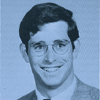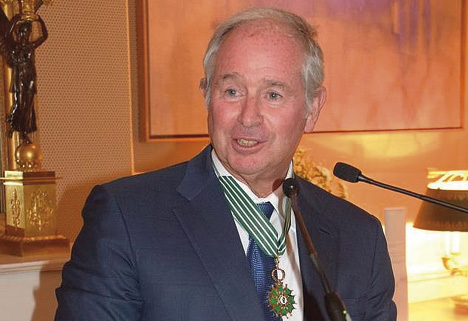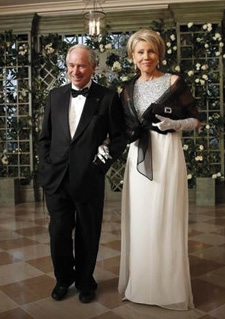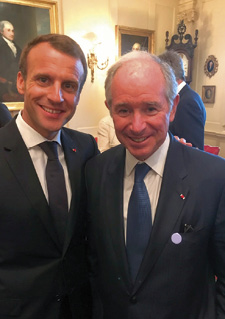Stephen A. Schwarzman – 50th Reunion Essay
Stephen A. Schwarzman
 Blackstone
Blackstone
345 Park Avenue, 44th Floor
New York, NY 10154
schwarzman@blackstone.com
212-583-5823
Spouse(s): Christine Hearst Schwarzman (1995 -); Ellen Philips (1971-1990)
Child(ren): Elizabeth “Zibby” Schwarzman (1976, Yale ’98); Edward “Teddy” Frank Schwarzman (1979)
Grandchild(ren): Phoebe Jane Right (2007); Owen Joseph Right (2007); Sadie Maxine Right (2013); Graham Cole Right (2014); Lucy Anne Schwarzman (2010); William Arthur Schwarzman (2013); Mary Josephine Schwarzman (2014)
Education: Abington Senior High School, Pennsylvania (1965), BA Yale University (1969), MBA Harvard Business School (1975). Adjunct Professor, Yale School of Management. Harvard Business School Board of Dean’s Advisors.
National Service: US Army Infantry Training, Fort Polk, Louisiana (1970)
Career: Chairman, CEO and Co-Founder of Blackstone
Avocations: Art-collecting, shooting, world travel, spending time with family and friends, sailing on boat Domino, reading. Philanthropy, including support of education and libraries globally and establishing the Schwarzman Center, a first-of-its-kind campus center in Yale’s historic “Commons” building; founding of an international scholarship program, “Schwarzman Scholars,” at Tsinghua University in Beijing to educate future leaders about China. Member: The Council on Foreign Relations, the business council, the business roundtable, and the international business council of the World Economic Forum; former Co-chair, Partnership for New York City. Board Member: The Asia Society, New York-Presbyterian Hospital, Advisory Board of School of Economics And Management at Tsinghua University (Beijing). Trustee, The Frick Collection (New York City); Chairman Emeritus of Board of Directors, The John F. Kennedy Center for The Performing Arts; Recipient, French Légion d’Honneur and Ordre des Arts et des Letters (Commandeur level). Former chairman, US President’s strategic and policy forum; Co-chair (with Jack Ma) of US-China Business Leaders Summit.
College: Davenport
It has been 50 years since we have graduated from Yale. It’s easy for me to measure Yale’s impact on my life—it has been profound.
At Yale, I learned to write, speak concisely, and develop logical arguments. I learned about philanthropy and the art of giving back. I became involved with cultural institutions for the first time. I learned about political engagement through meeting various senators, congressmen, and former Governor of New York and Ambassador Averell Harriman, the head of the Paris Peace Accords negotiating the end of the Vietnam War. I learned about the accident of association through getting to know George W. Bush, who was a year ahead of me in Davenport College and a member of my Senior Society, as well as meeting his father. Of course both of them became president of the United States. Finally, I learned about the critical importance of mentorship where I was rescued from failing freshman English by my professor, who gave me special instruction. I also was helped by a member of Yale’s admissions staff who directed me on how to get my first job in finance.
All of these lessons learned at Yale had a huge impact on my life. I never could have done what I have done professionally without being able to write, think, and marshal arguments, which are skills I use constantly. I’ve had the opportunity to chair one of the nation’s most important cultural institutions—The Kennedy Center for the Performing Arts in Washington, DC—and I have been on the board of numerous cultural institutions.
I have become a very active philanthropist, giving back in numerous areas, but particularly education. I learned education is essential to help an individual progress economically as well as to fashion a rewarding and complete life. From watching some of Yale’s greatest public servants, I became very interested in helping in the political dialogue at the local, state, and federal levels. I have managed to give advice to the most senior officials at every one of these jurisdictions, including some fascinating situations for several presidents, governors and mayors.
The accident of meeting George W. Bush at Yale helped transform part of my life by providing the opportunity to work part time in Washington, DC as well as having the access to affect a variety of important situations. These include helping to solve the global financial crisis for his administration along with helping Presidents Obama and Trump with a variety of critical matters affecting their presidencies.
Finally, I learned how to become a mentor for many individuals professionally, as well as helping underprivileged students and others in need, to provide opportunities for them to change their lives and accomplish their dreams.
My life has become a very full and active one. And it seems to become ever more crowded with important and wonderful things to do. Without attending Yale, and learning the lessons taught there, my life never would have developed the way it did. I owe Yale a deep debt of gratitude, which I have tried to honor and repay in numerous ways over the years. This includes providing advice to several presidents of Yale and supporting the university in a substantial way financially.
Without my experience at Yale, I believe I would have had a dramatically different and much more limited life with much less of an impact on others. The values and lessons learned at Yale were profound in terms of their impact, and I believe these values and unique educational opportunities, in the broadest sense, should be preserved and adapted in the future.

Steven Schwarzman: Legion of Honor Commandeur

Stephen & Christine Schwarzman at State Dinner, 2018

President Macron and Mr. Schwarzman
If the above is blank, no 50th reunion essay was submitted.
